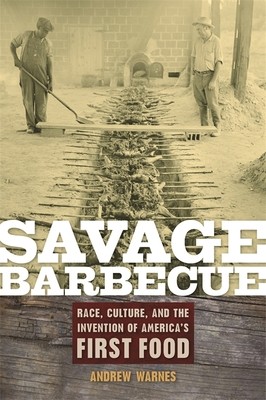
- We will send in 10–14 business days.
- Author: Andrew Warnes
- Publisher: University of Georgia Press
- ISBN-10: 0820331090
- ISBN-13: 9780820331096
- Format: 15.2 x 22.1 x 1.5 cm, softcover
- Language: English
- SAVE -10% with code: EXTRA
Reviews
Description
Barbecue is a word that means different things to different people. It can be a verb or a noun. It can be pulled pork or beef ribs. And, especially in the American South, it can cause intense debate and stir regional pride. Perhaps, then, it is no surprise that the roots of this food tradition are often misunderstood.
In "Savage Barbecue," Andrew Warnes traces what he calls America's first food through early transatlantic literature and culture. Building on the work of scholar Eric Hobsbawm, Warnes argues that barbecue is an invented tradition, much like Thanksgiving-one long associated with frontier mythologies of ruggedness and relaxation.
Starting with Columbus's journals in 1492, Warnes shows how the perception of barbecue evolved from Spanish colonists' first fateful encounter with natives roasting iguanas and fish over fires on the beaches of Cuba. European colonists linked the new food to a savagery they perceived in American Indians, ensnaring barbecue in a growing web of racist attitudes about the New World. Warnes also unearths the etymological origins of the word barbecue, including the early form barbacoa; its coincidental similarity to barbaric reinforced emerging stereotypes.
Barbecue, as it arose in early transatlantic culture, had less to do with actual native practices than with a European desire to define those practices as barbaric. Warnes argues that the word barbecue retains an element of violence that can be seen in our culture to this day. "Savage Barbecue" offers an original and highly rigorous perspective on one of America's most popular food traditions.
EXTRA 10 % discount with code: EXTRA
The promotion ends in 18d.22:24:50
The discount code is valid when purchasing from 10 €. Discounts do not stack.
- Author: Andrew Warnes
- Publisher: University of Georgia Press
- ISBN-10: 0820331090
- ISBN-13: 9780820331096
- Format: 15.2 x 22.1 x 1.5 cm, softcover
- Language: English English
Barbecue is a word that means different things to different people. It can be a verb or a noun. It can be pulled pork or beef ribs. And, especially in the American South, it can cause intense debate and stir regional pride. Perhaps, then, it is no surprise that the roots of this food tradition are often misunderstood.
In "Savage Barbecue," Andrew Warnes traces what he calls America's first food through early transatlantic literature and culture. Building on the work of scholar Eric Hobsbawm, Warnes argues that barbecue is an invented tradition, much like Thanksgiving-one long associated with frontier mythologies of ruggedness and relaxation.
Starting with Columbus's journals in 1492, Warnes shows how the perception of barbecue evolved from Spanish colonists' first fateful encounter with natives roasting iguanas and fish over fires on the beaches of Cuba. European colonists linked the new food to a savagery they perceived in American Indians, ensnaring barbecue in a growing web of racist attitudes about the New World. Warnes also unearths the etymological origins of the word barbecue, including the early form barbacoa; its coincidental similarity to barbaric reinforced emerging stereotypes.
Barbecue, as it arose in early transatlantic culture, had less to do with actual native practices than with a European desire to define those practices as barbaric. Warnes argues that the word barbecue retains an element of violence that can be seen in our culture to this day. "Savage Barbecue" offers an original and highly rigorous perspective on one of America's most popular food traditions.


Reviews